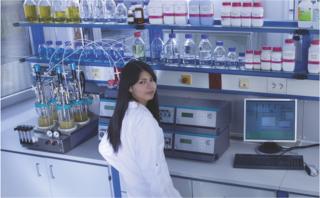Designed for Advanced ApplicationDesigned for Advanced Application

Emerging lifestyle diseases and an aging population are creating a number of major health challenges. Over the past few years, the food industry has been more focused on functional foods, those intended to be consumed within the normal diet but containing biologically active components with physiological benefits intended to reduce certain chronic diseases. This US$35 billion market has been steadily growing at 8-14% per year, as estimated by the Food and Agriculture Organization of the United States (FAO). Although the United States and Japan hold the largest markets in this industry, China is expected to double its share to US$12 billion/year by 2010.
Functional Food the: New Sphere of Action
Recent research shows that diet can affect the formation and course of diseases such as cancer, cardiovascular disease (CVD), osteoporosis, and Alzheimer’s disease. As a result, additives such as vitamins, fatty acids, probiotics, bioactive peptides, and antioxidants are added to food products to increase their function and value as dietary supplements and fortified foods. Most of these additives are produced using microbial biotechnology.
The DASGIP Parallel Bioreactor System is an enabling tool throughout microbial biotechnology processes. The DASGIP system allows selection and optimization of processes and yields at the R&D level. It is also used for monitoring process-relevant parameters in industrial-scale food production, as well as in quality control (QC).
R&D Profit with DASGIP Parallel Bioreactor Systems
The DASGIP Parallel Bioreactor System is designed for parallel and controlled fermentation of microorganisms to promote investigations in nutritional science. Processes using DASGIP systems benefit from high productivity, ease of scalability, and reliable reproducibility of test results.
One major exploratory focus in biologically active components is the advanced production of vitamins. For example, ascorbic acid (vitamin C) and vitamin E are known for their effects of reducing reactive oxygen species (ROS). ROS play an important role in the oxidation of DNA, proteins, and lipids, which are linked to aging, cancer, CVD, and neurodegenerative diseases. Researchers from the Institute of Biotechnology at the Research Centre of Juelich in Germany are working on advanced processes for fermentation production of vitamin C. Using a DASGIP system, they are developing a process for microbial conversion of sorbitol into vitamin C.
“With the help of our DASGIP Parallel Bioreactor System we were able to screen and investigate numerous G. oxidans strains regarding to the biomass production and product formation in a remarkably short time interval. Especially the automated off-gas analysis eases charactierzation of our best producers,” commented Dr. Christoph Bremus (former PhD student at the Research Centre of Juelich).
Individual control of temperature, agitation, pH, and dissolved oxygen in up to 16 parallel vessels in parallel allows DASGIP fermentation systems to accommodate even the most complex microbiology requirements. Flexible working volumes from 60 mL to 3 L provide researchers with a broad range of laboratory-scale experiment possibilities under aerobic and anaerobic conditions. By using the DASGIP Multipump Module for individual culture supplementation and substrate feed, batch and fed-batch operation is feasible. Using the DASGIP Gas Mixing Module, mass-flow controlled individual blending of air, nitrogen, oxygen, and carbon dioxide for each vessel is precise and intuitive. The DASGIP Off-Gas Analyzer offers real-time calculation of the oxygen uptake rate, the carbon dioxide evolution rate, and the respiratory quotient for easy monitoring of a culture’s metabolic state. Especially useful for high–cell-density cultures is the new level-control module, which provides early detection of changes in liquid height. When it is used with the Multipump Module, automated addition of antifoam can minimize excess foam formation. With these versatile features, DASGIP Parallel Bioreactor Systems offer sophisticated solutions for customized R&D procedures in the food industry.
Food Manufacturing and QC Take Advantage of the DASGIP Modular Concept
Manufacturing processes including quality control use DASGIP modules as analytical monitoring tools. All DASGIP modules can be integrated with third-party systems and used for regulation and control of industrial production of food products, such as dietary supplements, dairy products, or beverages. DASGIP customers in the food industry benefit from the ease of up- and downscaling their processes from development to manufacturing. Centralized monitoring data in the control software throughout development and production promote highly reproducible evaluation of relevant parameters.

DASGIP’s fourfold parallel bioreactor system ()
CSK Food Enrichment in Leeuwarden (The Netherlands) is a supplier for food ingredients using the DASGIP pH Control Module as a tool in QC for dairy product production. Bert Hafkamp, CSK’s application manager, told us, “As a user of the DASGIP system, we have experienced many advantages on working with the system. The system itself is easy to use, even for nonexperienced operators. Calibration of all electrodes can be performed in one step, which reduces the time for calibration. When all data are collected, the easy-access software is a powerful tool that converts all data to Microsoft excel format with the click of a button. For quality control purposes, a new tool is developed by which pH values can be compared with results of reference samples. With a BioBlock and a Multipump module, we have a very flexible system that meets most of our fermentation requirements.”
Conclusion
DASGIP technology is designed for advanced applications with hardware precision and software flexibility. DASGIP components can be run as a system or modularly integrated into third-party systems for providing specialized applications in nutritional science and food production with high productivity, reliable reproducibility, and ease of scalability.
You May Also Like






